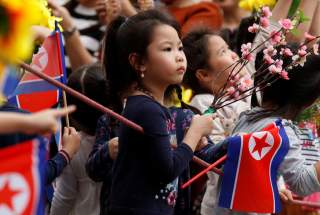The Hanoi Summit – We Asked Christine Ahn What Happens Next in U.S.-North Korea Relations
"The failure of Hanoi calls for women's leadership."
Editor’s Note: Looking for more opinions on where we go after the Hanoi summit? Check out all 80 expert takes on where U.S-North Korea relations go next here.
On the morning of the summit in Vietnam between Donald Trump and Kim Jong-un, I told my six-year-old daughter by phone from Hanoi, “Today is the day that the United States and North Korea may declare an end to the Korean War so Koreans may finally live in peace.” By lunch, the summit ended abruptly and both sides retreated with differing narratives over why talks failed.
Trump says North Korea’s denuclearization will “ultimately get solved,” but to do so will require ending the Korean War and signing a peace agreement. Those who have succeeded in freezing North Korea’s nuclear program, including President Jimmy Carter and Defense Secretary William Perry, agree that a peace agreement and the normalization of relations would offer the best chance of getting North Korea to denuclearize.
Given that the two countries have been at war for seventy years, the United States and North Korea need to establish trust. The repatriation of U.S. servicemen remains, for example, has helped establish military-to-military working relationships. Through liaison offices in Pyongyang and Washington, U.S. and North Korean officials can take steps to build trust by facilitating family reunions between Korean Americans and their relatives in North Korea and trouble-shooting sanctions that impede humanitarian operations that provide vital support to vulnerable North Korean civilians. As America’s special representative Stephen Biegun says of U.S. humanitarian workers, they are “the best representations of American values” for ordinary North Koreans.
Recognizing that progress on denuclearization hinges on peace and normalization, twenty-two U.S. lawmakers introduced a congressional resolution calling for an end to the Korean War and the establishment of a peace process. The majority of the sponsors are women, who also call on the Trump administration to implement the Women, Peace, and Security Act of 2017. Why? Because studies show that when women’s groups are involved, a peace agreement is almost always reached and more likely to last.
To jumpstart the process for women’s inclusion in peace negotiations, a delegation of South Korean women Parliamentarians are in Washington, DC, this week to discuss with members of Congress how U.S. and South Korean lawmakers can end the Korean War. And in a letter to president Trump and chairman Kim, over two-hundred-and-fifty prominent women, including Nobel Peace Laureates and feminist icons such as Gloria Steinem, Alice Walker and Jane Fonda, called on the two leaders to establish a peace process that includes women.
After the failed summit in Hanoi, we cannot let this once-in-a-lifetime opportunity to end America’s oldest war be squandered. This historic moment calls for the wisdom and experience of those with an established record of building peace, especially women.
Christine Ahn is the founder and International Coordinator of Women Cross DMZ, a global movement of women mobilizing to end the Korean War, reunite families, and ensure women’s leadership in peace building.
Image: Reuters

